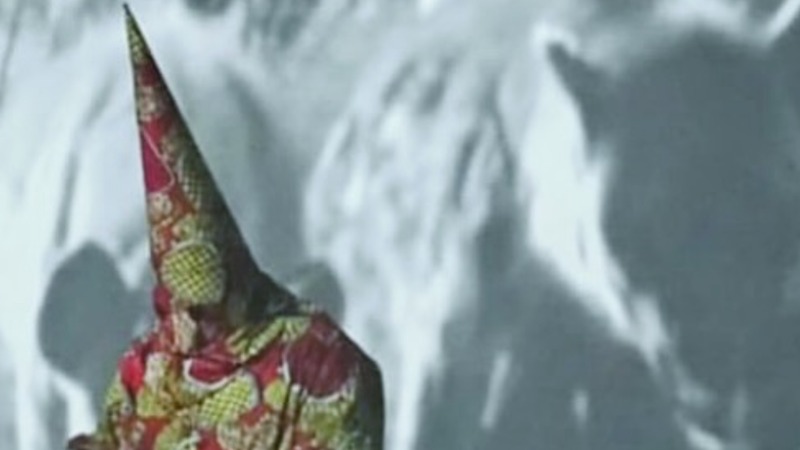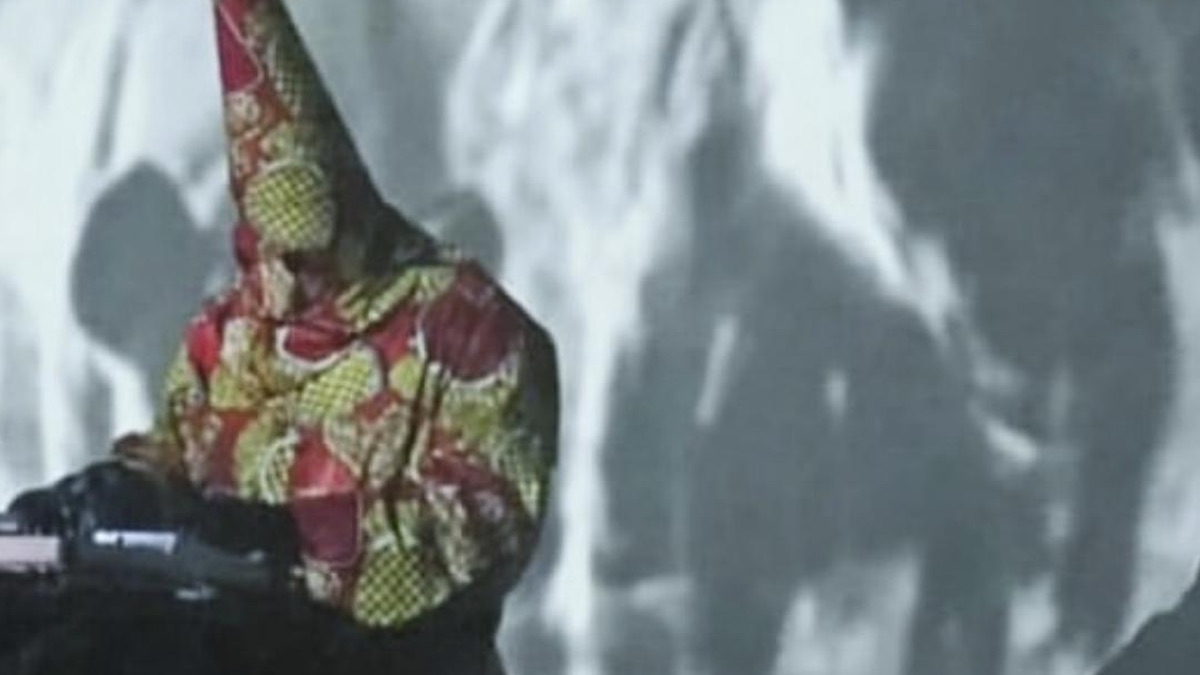Unmasking the Deceiver: When Artifice Crumbles Under Scrutiny
In a revelation that has sent shockwaves through the experimental music scene and beyond, a long-running project known as African Imperial Wizard, previously shrouded in an elaborate and provocative persona, has been unmasked as a breathtakingly audacious, and deeply offensive, hoax. What was once presented as a one-man ‘tribal industrial’ act steeped in the mystique of Angolan liberation-war pedigree and an ancestral hotline to the spirit world has now been exposed as the elaborate charade of a ‘middle-aged white guy’ engaging in what has been described as ‘Africa-themed KKK cosplay.’ This scandal transcends mere artistic controversy, delving into the murky waters of cultural appropriation, racial insensitivity, and outright deception, forcing a reckoning within an industry often lauded for its boundary-pushing.
For years, African Imperial Wizard cultivated an image built on a foundation of purported authenticity, weaving narratives of a deeply spiritual and politically charged heritage into its sonic output. The music itself, a challenging blend of industrial textures and tribal rhythms, gained a certain notoriety, drawing listeners intrigued by its exoticized backstory and confrontational aesthetic. The mystique was potent, crafting a figure seemingly from another world, channeling forgotten histories and ancestral voices into a visceral sonic experience. This meticulously constructed façade allowed the project to operate within a specific niche, garnering attention and, presumably, a dedicated following who bought into the narrative hook, line, and sinker.
The intricate web of this deception began to unravel when critically acclaimed experimental outfit Xiu Xiu took to Instagram, issuing a direct and unambiguous call-out. Known for their fearless artistic integrity and often provocative work, Xiu Xiu’s intervention served as a crucial catalyst, pulling back the curtain on a performance that was far more sinister than anyone had initially imagined. Their public statement, terse but impactful, ignited a firestorm, transforming whispers into a roar and compelling the wider music community to confront an uncomfortable truth.
“We feel it’s our responsibility to call out blatant fraud and harmful appropriation. The ‘African Imperial Wizard’ is not who they claim to be. This is a white individual exploiting sensitive cultural and historical narratives for personal gain, wrapped in a deeply offensive KKK-themed visual language. It’s a disgrace to art and to humanity.”
The core of the exposé revealed that the individual behind African Imperial Wizard was not, as suggested by the project’s name and narrative, of African descent, nor did they possess any genuine connection to the Angolan history they so readily invoked. Instead, the individual in question is a middle-aged white man, whose elaborate cultural pantomime involved dressing in costumes disturbingly reminiscent of KKK robes, albeit with an ‘Africa-themed’ twist. This revelation has not only shattered the illusion of artistic authenticity but has also exposed a profound level of disrespect and cynical manipulation.
The Audacity of Appropriation: Unpacking Layers of Deception
The audacity of the deception is multi-faceted. It began with the very name: ‘African Imperial Wizard’ itself is a calculated provocation, coupling a geographical identifier with a term loaded with the horrific history of white supremacy and racial terror. To then build an entire artistic persona around fabricated Angolan liberation-war pedigree and an ‘ancestral hotline to the spirit world’ represents a deeply problematic form of cultural appropriation, co-opting genuine struggles and sacred beliefs for the sake of artistic notoriety. The explicit mention of KKK cosplay elevates this from mere appropriation to outright racial provocation, suggesting a callous disregard for the trauma and historical pain associated with the Ku Klux Klan and its ideology.
- Fabricated Identity: The cornerstone of the deception was a completely manufactured identity, leveraging racial and cultural signifiers for artistic packaging.
- Historical Exploitation: Exploiting the sensitive and sacred history of Angolan liberation, a real struggle for freedom and self-determination, for a fictional persona.
- Spiritual Commodification: The claim of an ‘ancestral hotline to the spirit world’ represents a gross commodification and trivialization of deep spiritual practices.
- Racial Provocation: The use of ‘Africa-themed KKK cosplay’ is an abhorrent blending of racist iconography with appropriated cultural elements, designed to shock and offend.
The KKK element in particular is unforgivable. Regardless of any artistic intent or supposed commentary, the visual association with a domestic terrorist organization responsible for centuries of horrific violence against Black people is not merely ‘provocative’; it is deeply racist and offensive. To then intertwine this imagery with African cultural themes suggests a twisted logic that prioritizes controversy and shock value over any semblance of respect or ethical consideration. This isn’t art pushing boundaries; it’s a cheap shot wrapped in a cloak of perceived intellectualism, designed to garner attention through outrage.
When Cultural Theft Becomes Racial Vandalism
The incident forces a critical re-evaluation of how audiences consume and interpret art, especially in the digital age where personas can be meticulously crafted and sustained with relative ease. It also highlights the responsibility of the artistic community to police its own, to question authenticity, and to call out practices that are not only exploitative but actively harmful. Xiu Xiu’s courageous stand serves as a testament to the power of collective accountability, demonstrating that silence in the face of such blatant deception is not an option.
“Authenticity in art, particularly when engaging with sensitive cultural narratives, isn’t a luxury; it’s a fundamental ethical obligation. When that trust is breached so flagrantly, it undermines the very foundation of artistic exchange.”
The motivations behind such a prolonged and elaborate deception are complex, ranging perhaps from a desire for notoriety and a distorted sense of artistic freedom to a cynical exploitation of identity politics for shock value. Whatever the underlying reasons, the outcome is a profound betrayal of trust, not just for those who were fans of African Imperial Wizard, but for anyone who believes in the integrity of artistic expression. It casts a shadow over the experimental music scene, raising questions about due diligence and the ease with which one can construct and profit from a false identity.
The Unfolding Aftermath: A Call for Accountability and Reflection
The exposure of African Imperial Wizard as a white man in racist cosplay serves as a stark reminder of the persistent challenges surrounding cultural appropriation, racial sensitivity, and the deceptive allure of online personas. In an era where digital identities can be curated with unprecedented precision, the line between performance and fraud becomes increasingly blurred. This incident is not an isolated one; the history of music is replete with examples of artists borrowing, often without consent or proper attribution, from cultures that are not their own. However, the addition of the KKK iconography and the sheer scale of the fabricated narrative push this case into a particularly egregious category.
- Erosion of Trust: The incident severely erodes public trust in artistic claims, especially those involving marginalized identities and sensitive histories.
- Industry Scrutiny: It prompts a necessary, albeit uncomfortable, discussion within the music industry about gatekeeping, validation, and accountability.
- Re-evaluation of Artistry: Audiences are now forced to re-evaluate the art created under such fraudulent pretenses, questioning its value and intent.
- Empowerment of Whistleblowers: Xiu Xiu’s action empowers other artists and community members to speak out against similar deceptions.
The fallout from this unmasking will undoubtedly be significant, not only for the individual behind African Imperial Wizard, who now faces widespread condemnation, but also for the broader conversation about ethics in art. It highlights the critical importance of interrogating the narratives presented to us, especially when they touch upon issues of race, culture, and history. The incident serves as a cautionary tale, demonstrating that while artistic freedom is paramount, it does not, and should not, extend to the realm of racial deceit and the grotesque glorification of hate speech. The music world must now grapple with the implications of allowing such a deception to fester for so long, and collectively work towards a future where authenticity, respect, and ethical engagement are not just ideals, but enforceable standards.


